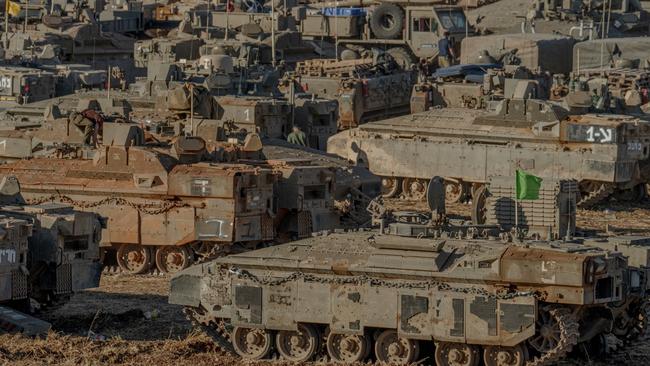
When I visited Beirut as foreign secretary and met Christian, Muslim and Druze leaders, I found them to be talented, ingenious people. If they could only escape from the labyrinth of their politics, their country would be rich and successful.
One of them was Najib Mikati, the prime minister then and now, one of the world’s most patient and resilient leaders. He has told the UN that a million Lebanese have fled their homes in recent days – perhaps a fifth of the entire population displaced and needing help. They are the helpless victims of gridlocked politics that is intricately connected with events in Syria and with Israel’s security. That in turn brings foreign invaders. In 1982 and again in 2006, Israel invaded Lebanon but only outraged world opinion while making Lebanese politics even more intractable and Israel itself, in the longer term, less secure.
During the 2006 conflict, I upset many supporters of Israel – of whom I have always been one – by saying in the Commons that the invasion of Lebanon was disproportionate and counterproductive. This was nevertheless true: the Israeli air force ran out of precise targets very quickly and attacked civilian infrastructure, the army became bogged down and was fought to a standstill by Hezbollah.

The latter brought devastation on the country but were thereafter the heroes of resistance to Israel, the most cherished proxies of Iran and a force that turned Lebanon’s divisions into concrete. For Israel, invading Lebanon has never turned out well, another of history’s countless examples of peace and security being elusive if pursued by force alone.
It remains to be seen whether Israel will repeat past mistakes. A ground invasion of the same kind as before – rather than more limited incursions – risks similar outcomes.
Yet what Israel’s armed forces and intelligence agencies have done to Hezbollah in the past two weeks is so far entirely different to 2006. What we have witnessed is not only an immense shock to Israel’s enemies across the region, particularly a stunned Iranian leadership, but also a wake-up call to anyone in the world who hasn’t noticed that military technology is moving on at extraordinary speed.
Political vision is still needed for long-term peace and security, which is where Benjamin Netanyahu and the current Israeli government are still woefully deficient. But in the last fortnight they have shown that an up-to-the-minute combination of data analytics, AI, cyber-penetration and conventional weapons can be utterly devastating – even to adversaries who thought themselves prepared.
Some of what the Israelis have achieved has been old tricks done well. Sending faulty or doctored goods to an enemy by entering a supply chain is probably not unusual, although making thousands of pagers and walkie-talkies explode simultaneously is a spectacular example of that. It is the new techniques that are so striking, with vast quantities of data being trawled through by AI programmes to produce a more precise picture than ever before of the whereabouts of weapons systems and leaders.

The result is that Israeli forces, who had only a couple of hundred precise targets to attack in 2006, have had thousands to choose from this time. They have included large numbers of rocket launchers and the great majority of the Hezbollah leadership, who are now dead. On Friday, Hassan Nasrallah, the long-familiar voice and inspiration of Hezbollah, went the same way, following the Hamas leader Ismail Haniyeh in Tehran two months ago.
No wonder it is reported that Iran’s supreme leader, Ayatollah Khamenei, has been moved to a so-called “safe” location. But in the world now dawning, safe locations do not exist.
This lesson should not be lost on leading nations around the world, irrespective of the situation in the Middle East. Today’s technological advances are producing an exponential expansion of military power for those who invest in them. Being at the leading edge of AI and other innovations, with sovereign capabilities, is not just a matter of economic advantage but potentially of national survival. If it was Hezbollah, Iran and the Houthis that were leading in such technology, rather than on the receiving end of it, Israel would now be on the brink of destruction.
The immediate lesson for them – the “axis of resistance” – is that this is a conflict that they are not, for now, going to win. It is still possible that the region could explode in a complete conflagration, with full-on war between Iran and Israel, and the US drawn in. But with so much of their leadership, communications and military force in Lebanon degraded, they would be well advised to draw back, hoping that Israel overreaches on the ground and makes the same mistakes as in previous wars.
There is immense satisfaction among Israeli ministers that they have learnt from 2006, and that the prowess of the IDF and the intelligence agencies has been reaffirmed after the disaster of October 7 last year. Netanyahu once again tops the polls, with an additional party strengthening his government on Sunday night, and is even speaking of changing the balance of power in the Middle East.
Steady on, though. If Israel has just taught the world in general and its enemies in particular the shattering effect of combining arms with new technology, history still has a lesson for its leaders: you will never have permanent peace without a credible political vision of it.
Even if Iranian leaders decide to lick their wounds this time, they will invest more in the Houthis in Yemen and seek to rebuild Hezbollah. They could be more likely to develop a nuclear weapon. And in Gaza, where Israel has won a complete military victory, there is a political vacuum, in which many thousands of young men will be discovering their determination to fight a future war. Israel has reaffirmed dramatically that it is the dominant power in the region. But it will have to do the same over and over again, one generation after another, if it does not seek the political and physical space to one day make peace with its Palestinian neighbours.
Such peace is not available today, with the surviving Hamas leadership as obstructive of a ceasefire as Netanyahu himself. It will need the assertion of Arab leadership to make that possible, but also a different approach by Israelis from their recent history of keeping even moderate Palestinians weak and divided while encroaching ever more in the West Bank.
The military force of the past two weeks has been salutary. In the end, however, political solutions are needed as well. For evidence of that, Israelis need only look next door – at the pitiful state of Lebanon.
The Times





Few countries in the world illustrate more powerfully than Lebanon how much politics matters. A country in an advantageous geographic position, with natural resources, major ports, a Mediterranean climate and industrious people is imprisoned in sectarian and political deadlock.